Medical Anthropology | Book Series
About This Project
Medical Anthropology
Health, Inequality,
and Social Justice
Book Series
Lenore Manderson
Rutgers University Press
The Series
Books in the Medical Anthropology series are concerned with social patterns of and social responses to ill health, disease, and suffering, and how social exclusion and social justice shape health and healing outcomes. The series is designed to reflect the diversity of contemporary medical anthropological research and writing, and will offer scholars a forum to publish work that showcases the theoretical sophistication, methodological soundness, and ethnographic richness of the field.
Books in the series may include studies on the organisation and movement of peoples, technologies, and treatments, how inequalities pattern access to these, and how individuals, communities and states respond to various assaults on wellbeing, including from illness, disaster, and violence.
Contact
MEDICAL ANTHROPOLOGY:
HEALTH INEQUALITY, AND SOCIAL JUSTICE
Titles in the Series
The Politics of Potential
Global Health and Gendered Futures in South Africa
The first one thousand days of human life, or the period between conception and age two, is one of the most pivotal periods of human development. Optimizing nutrition during this time not only prevents childhood malnutrition but also determines future health and potential. The Politics of Potential examines early life interventions in the first one thousand days of life in South Africa, drawing on fieldwork from international conferences, government offices, health-care facilities, and the everyday lives of fifteen women and their families in Cape Town. Michelle Pentecost explores various aspects of a politics of potential, a term that underlines the first one thousand days concept and its effects on clinical care and the lives of childbearing women in South Africa. Why was the First One Thousand Days project so readily adopted by South Africa and many other countries? Pentecost not only explores this question but also discusses the science of intergenerational transmissions of health, disease, and human capital and how this constitutes new forms of intergenerational responsibility. The women who are the target of first one thousdand days interventions are cast as both vulnerable and responsible for the health of future generations, such that, despite its history, intergenerational responsibility in South Africa remains entrenched in powerfully gendered and racialized ways.
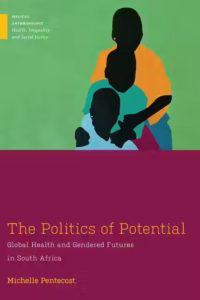

Forgotten Bodies
Imperialism, Chuukese Migration, and Stratified Reproduction in Guam
Women from Chuuk, Federated States of Micronesia, who migrate to Guam, a U.S. territory, suffer disproportionately poor reproductive health outcomes. Though their access to the United States is unusually easy, through a unique migration agreement, it keeps them in a perpetual liminal state as nonimmigrants, who never fully belong as part of the United States Chuukese women move to Guam, sometimes with their families but sometimes alone, in search of a better life: for jobs, for the education system, or to access safe health care. Yet, the imperial system they encounter creates underlying conditions that greatly and disproportionately impact their ability to succeed and thrive, negatively impacting their reproductive health. Through clinical and community ethnography, Sarah A. Smith illuminates the way this system stratifies women’s reproduction at structural, social, and individual levels. Readers can visualize how U.S. imperialist policies of benign neglect control the body politic, change the social body, and render individual bodies vulnerable in the twenty-first century but also how people resist.
The Best Place
Addiction, Intervention, and Living and Dying Young in Vancouver
In both local and international imaginations, Vancouver, Canada, is often celebrated as one of the world’s most beautiful, cosmopolitan, and livable cities. Simultaneously, the city continues to be ground zero for successive waves of public health emergency and intervention, including a recent and unprecedented drug overdose crisis driven by the proliferation of illicitly manufactured fentanyl and related analogs in the local drug supply. In The Best Place: Addiction, Intervention, and Living and Dying Young in Vancouver, Danya Fast explores these politics of place from the perspectives of young people who use drugs. Those who are the subject of this book were in many ways relegated to the social, spatial, and economic margins of the city. Yet, they were also often at the very center of city life and state projects, including the project of protecting life in the context of the current overdose crisis.


Calling Family
Digital Technologies and the Making of Transnational Care Collectives
Viral Frictions How do digital technologies shape both how people care for each other and, through that, who they are? With technological innovation is on the rise and increasing migration introducing vast distances between family members–a situation additionally complicated by the COVID-19 pandemic and the requirements of physical distancing, especially for the most vulnerable – older adults–this is a pertinent question. Through ethnographic fieldwork among families of migrating nurses from Kerala, India, Tanja Ahlin explores how digital technologies shape elder care when adult children and their aging parents live far apart. Coming from a country in which appropriate elder care is closely associated with co-residence, these families tinker with smartphones and social media to establish how care at a distance can and should be done to be considered good. Through the notion of transnational care collectives, Calling Family uncovers the subtle workings of digital technologies on care across countries and continents when being physically together is not feasible. Calling Family provides a better understanding of technological relationality that can only be expected to further intensify in the future.
Making Uncertainty
Tuberculosis, Substance Use, and Pathways to Health in South Africa
Making Uncertainty: Tuberculosis, Substance Use, and Pathways to Health explores what happens when tuberculosis and substance use intersect in healthcare facilities in Cape Town, South Africa. Through a close look at life and care, this fine-grained hospital ethnography provides new perspectives on how sickness and health are made.

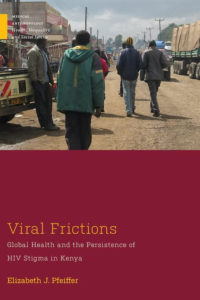
Viral Frictions
Global Health and the Persistence of HIV Stigma in Kenya
Viral Frictions explores how and why HIV-related stigma persists in the age of treatment. Based on a decade of fieldwork in a highway trading center in Kenya, Pfeiffer offers compelling stories of stigma as a lens for understanding broader social processes, the complexities of globalization and health, intersectionality, and their profound impact on the everyday social lives and relationships of people living through the ongoing HIV epidemic in sub-Saharan Africa.
The Cancer Within
Reproduction, Cultural Transformation, and Health Care in Romania
The Cancer Within examines cervical cancer in Romania as a point of entry into an anthropological reflection on contemporary health care. Fashioned by patriarchal relations, lived religion, and the historical trauma of pronatalism, Romanian women’s responses to reproductive medicine and cervical cancer prevention are complicated by neoliberal reforms to medical care.
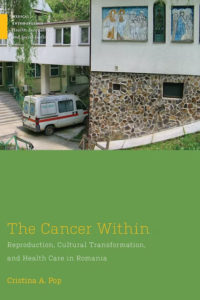

Near Human
Border Zones of Species, Life, and Belonging
Near Human is an ethnography of research piglets in biomedical experiments and premature human infants in clinical care in Denmark. Drawing on fieldwork carried out on farms, in animal-based science labs, and in hospitals, Mette N. Svendsen redirects the question of “what it means” to be human to “what it takes” to be human and to forge a nation.
At Ansha’s
Life in the Spirit Mosque of a Healer in Mozambique
At Ansha’s takes the reader inside the spirit mosque of a female healer in Nampula, northern Mozambique. It is here that Ansha, a Makonde spirit healer, cures the resisting ailments of her patients, discloses pieces of her story of affliction and healing, and engages the borders of her world.
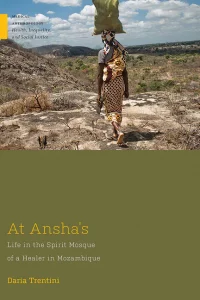
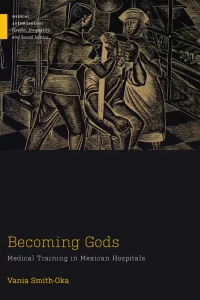
Becoming Gods
Medical Training in Mexican Hospitals
Becoming Gods is a vivid ethnography of how a cohort of doctors-in-training in the Mexican city of Puebla learn to become doctors. It illustrates the messy, complex, and nuanced nature of medical training, where trainees not only have to acquire a monumental number of skills but do so against a backdrop of strict hospital hierarchy and a crumbling national medical system that deeply shape who they are.
Dying to Count
Post-Abortion Care and Global Reproductive Health Politics in Senegal
Dying to Count explores how national and global population politics collide in Senegalese hospitals as health workers treat and document women who present with complications of abortion. Siri Suh’s ethnography illustrates political, economic, professional, and technological factors that jeopardize quality of and access to obstetric care in public hospitals despite national and global commitments to reproductive health.


The Devil’s Fruit
Farmworkers, Health, and Environmental Justice
The Devil’s Fruit uses anthropology’s tool kit to examine farmworkers’ embodiment of toxic pesticides and social and workplace relationships in California’s agricultural industry. Rather than stopping at description and critique, Saxton explores how activist ethnographic methods and ethics align, conflict, and support ongoing struggles for farmworker health and environmental justice.
Cultural Anxieties
Managing Migrant Suffering in France
Cultural Anxieties is a compelling ethnography about Centre Minkowska, a transcultural psychiatry clinic in Paris, France. From her unique position as both observer and staff member, Stéphanie Larchanché explores the challenges of providing non-stigmatizing mental healthcare to migrants, and she identifies practical routes for improving caregiving practices.
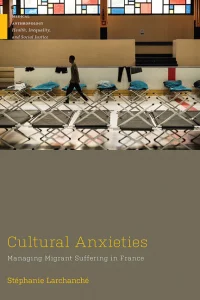
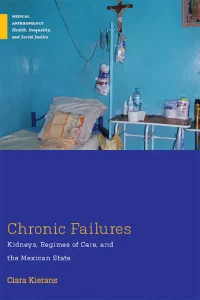
Chronic Failures
Kidneys, Regimes of Care, and the Mexican State
Chronic Failures: Kidneys, Regimes of Care and the Mexican State is about Chronic Kidney Disease (CKD) and the relentless search for care within a context of poverty, inequality and uneven welfare arrangements. Documenting the routes taken to access care, the practices of patients without entitlement offer critical perspectives on state-market-healthcare relations.
Pathogenic Policing
Immigration Enforcement and Health in the U.S. South
In Pathogenic Policing, Nolan Kline focuses on the hidden, health-related impacts of immigrant policing to examine the role of policy in shaping health inequality in the U.S., and responds to fundamental questions regarding biopolitics, especially the ways in which policy can reinforce ‘race’ as a vehicle of social division.


Infected Kin
Orphan Care and AIDS in Lesotho
AIDS has devastated communities across southern Africa. In Lesotho, a quarter of adults are infected. In Infected Kin, Block and McGrath argue that AIDS is fundamentally a kinship disease, examining the ways it transcends infected individuals and seeps into kin relations and networks of care.
Sugar and Tension
Diabetes and Gender in Modern India
In Sugar and Tension, Lesley Jo Weaver uses women’s experiences with diabetes in New Delhi as a lens to explore how gendered roles and expectations are taking shape in contemporary India. Weaver describes how women negotiate the many responsibilities in their lives when chronic disease is at stake.


Andrea Whittaker traces the development of international surrogacy industry and its movement across Southeast Asia following a sequence of governmental bans in India, Nepal, Thailand, and Cambodia. The book offers a nuanced and sympathetic examination of the industry from the perspectives of the people involved in it.
Legitimating Life
Adoption in the Age of Globalization and Biotechnology
Sonja van Wichelen boldly describes how contemporary justifications of cross-border adoption navigate between child welfare, humanitarianism, family making, capitalism, science, and health. Focusing on contemporary institutional practices of adoption in the United States and the Netherlands, she traces how professionals, bureaucrats, lawyers, politicians, social workers, and experts legitimate a practice that became progressively controversial.


Psychiatric Encounters
Madness and Modernity in Yucatan, Mexico
Psychiatric Encounters presents an intimate portrait of a public inpatient psychiatric facility in the Southeastern state of Yucatan, Mexico. The book explores the experiences of patients and psychiatrists as they navigate the challenges of public psychiatric care in Mexico.
Faith and the Pursuit of Health
Cardiometabolic Disorders in Samoa
Faith and the Pursuit of Health explores how Pentecostal Christians manage chronic illness in ways that sheds light on health disparities and social suffering in Samoa, a place where rates of obesity and related cardiometabolic disorders have reached population-wide levels.


Fistula Politics
Birthing Injuries and the Quest for Continence in Niger
In Western humanitarian and media narratives, obstetric fistula is presented as deeply stigmatizing, resulting in divorce, abandonment by kin, exile from communities, depression and suicide. Heller illustrates the inaccuracy of these popular narratives and shows how they serve the interests not of the women so affected, but of humanitarian organizations, the media, and local clinics.
Landscapes of Activism
Civil Society, HIV and AIDS Care in Northern Mozambique
AIDS activists are often romanticized as extremely noble and selfless. However, the relationships among HIV support group members highlighted in Landscapes of Activism are hardly utopian or ideal. Reed shows that in Africa, superimposing a Western idea of what activism should look like actually hampers the success of these groups.
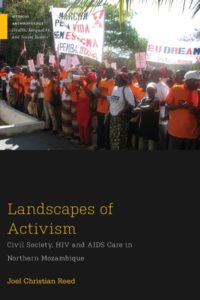

Fault Lines of Care
Gender, HIV, and Global Health in Bolivia
Heckert provides a detailed examination of the effects of global health and governmental policy decisions on the everyday lives of people living with HIV in Santa Cruz, Bolivia. She focuses on the gendered dynamics that play a role in the development and implementation of HIV care programs and shows how decisions made from above impact what happens on the ground.

